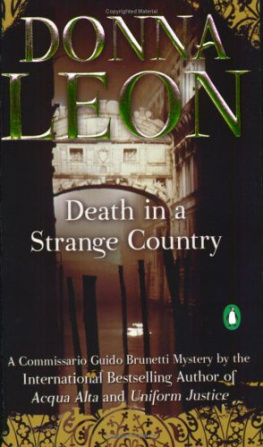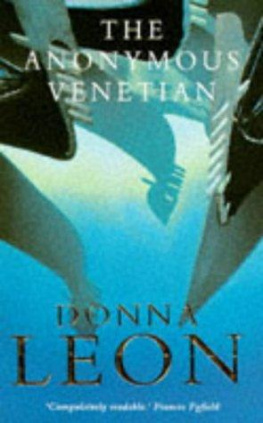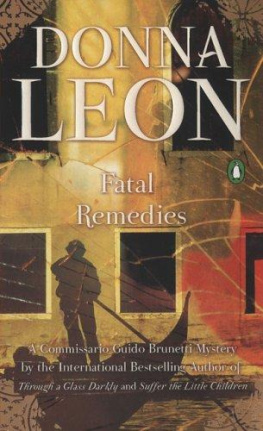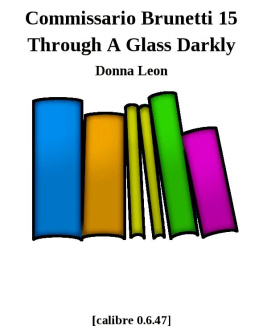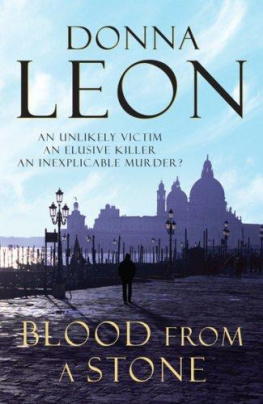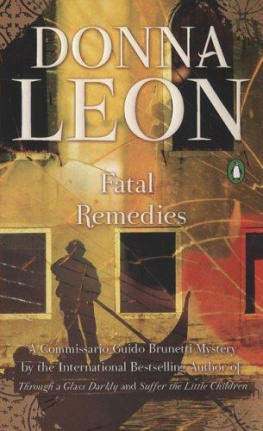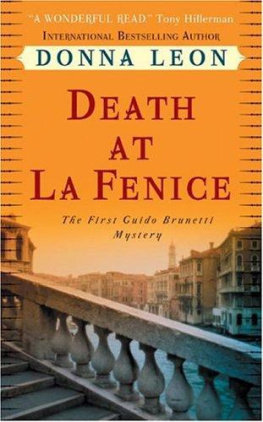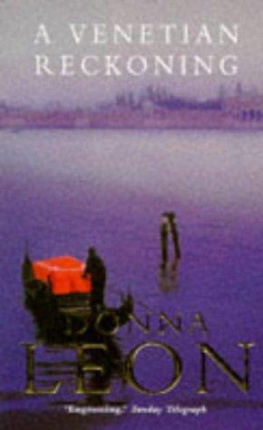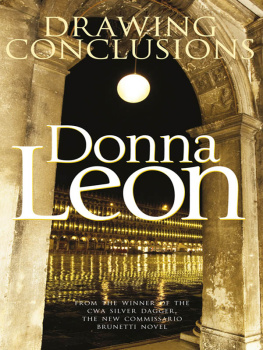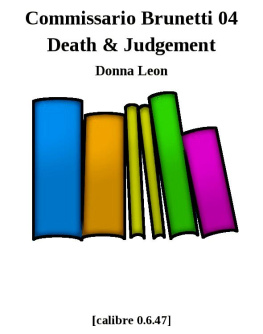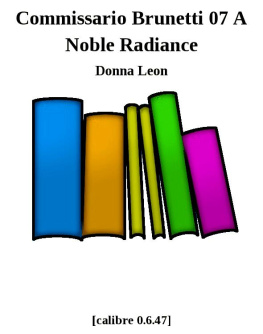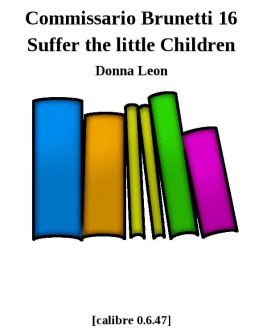* ** *
Death in aStrange Country
[CommissarioBrunetti 02]
By DonnaLeon
Scanned& Proofed By MadMaxAU
* * * *
Volgi intorno lo squardo, oh sire, e vedi qual strageorrenda nel tuo nobil regno, fa il crudo mostro. Ah mira allagate di sangue quellepubbliche vie. Ad ogni passo vedrai chi geme, e lalma gonfia datro velen dalcorpo esala.
Gaze around you, oh sire, and seewhat terrible destruction the cruel monster has wrought in your noble kingdom.Look at the streets swamped in blood. At every step you see someone groaning,the spirit leaving a corpse swollen with horrible poison.
Idomeneo
* ** *
* ** *
The body floated face down in the murky water of thecanal. Gently, the ebbing tide tugged it along towards the open waters of the lagunathat spread out beyond the end of the canal. The head bumped a few timesagainst the moss-covered steps of the embankment in front of the Basilica ofSanti Giovanni e Paolo, lodged there for a moment, then shifted free as thefeet swung out in a delicate balletic arc that pulled it loose and set it againdrifting towards the open waters and freedom.
Close by, the bells ofthe church chimed four in the morning, and the waters slowed, as if ordered todo so by the bell.
Gradually, they slowedeven more, until they reached that moment of utter stillness that separates thetides, when the waters wait for the new tide to take over the days work.Caught in the calm, the limp thing bobbed on the surface of the water,dark-clad and invisible. Time passed in silence and then was broken by two menwho walked by, chatting in soft voices filled with the - easy sibilance of theVenetian dialect. One of them pushed a low cart loaded with newspapers which hewas taking back to his newsstand to begin the day; the other was on his way towork in the hospital that took up one entire side of the vast open campo.
Out in the laguna, asmall boat puttered past, and the tiny waves it raised rippled up the canal andtoyed with the body, shifting it back up against the embankment wall.
As the bells chimed five,a woman in one of the houses that overlooked the canal and faced onto the campoflung open the dark-green shutters of her kitchen and turned back to lowerthe flaming gas under her coffee pot. Still not fully awake, she spooned sugarinto a small cup, flipped off the gas with a practised motion of her wrist, andpoured a thick stream of coffee into her cup. Cradling it in her hands, shewalked back to the open window and, as she had every morning for decades, lookedacross at the giant equestrian statue of Colleoni, once the most fearsome ofall Venetian military leaders, now her nearest neighbour. For Bianca Pianaro,this was the most peaceful moment of the day, and Colleoni, cast into eternalbronze silence centuries ago, the perfect companion for this precious, secretquarter-hour of silence.
Glad of its sharp warmth,she sipped at her coffee, watching the pigeons that had already begun to pecktheir way towards the base of the statue. Idly, she glanced directly below her,to where her husbands small boat bobbed in the dark-green water. It had rainedin the night, and she looked to see if the canvas tarpaulin that covered theboat was still in place. If the tarpaulin had been pulled free by the wind,Nino would have to go down and bail the boat out before he went to work. Sheleaned out, providing herself a clear view of the bow. At first, she thought itwas a bag of rubbish, swept from the embankment by the nights tide. But it wasstrangely symmetrical, elongated, with two branches sweeping out on either sideof the central trunk, almost as if it were...
Oh, Dio, shegasped and let her coffee cup fall into the waters below, not far from thestrange shape floating face down in the canal. Nino, Nino, she screamed,turning back towards their bedroom. Theres a body in the canal.
It was this same message,Theres a body in the canal, that woke Guido Brunetti twenty minutes later.He shifted up onto his left shoulder and pulled the phone onto the bed with him.Where?
Santi Giovanni e Paolo.In front of the hospital, sir, answered the policeman who had called him assoon as the call came into the Questura.
What happened? Who foundhim? Brunetti asked, swinging his feet out from beneath the covers and sittingup on the edge of the bed.
I dont know, sir. A mannamed Pianaro called to report it.
So why did you call me?Brunetti asked, making no attempt to hide the irritation in his voice, theclear result of the time indicated on the glowing face of the clock beside thebed: five-thirty-one. What about the night shift? Isnt anyone there?
Theyve all gone home,sir. I called Bozzetti, but his wife said he wasnt home yet. As he spoke, theyoung mans voice grew more and more uncertain. So I called you, sir, becauseI know youre working day shift. Which, Brunetti reminded himself, began intwo and a half hours. He said nothing.
Are you there, sir?
Yes, Im here. And itsfive-thirty.
I know, sir, the young manbleated. But I couldnt find anyone else.
All right. All right. Illgo down there and have a look. Send me a launch. Now. Remembering the hour andthe fact mat the night shift had already gone off duty, he asked, Is thereanyone who can bring it?
Yes, sir. Bonsuan justcame in. Shall I send him?
Yes, right now. And callthe rest of the day shift. Tell them to meet me there.
Yes, sir, the young manresponded, his relief audible at having someone take charge.
And call DoctorRizzardi. Ask him to meet me there as quickly as he can.
Yes, sir. Anything else,sir?
No, nothing. But sendthe launch. Right now. And tell the others, if they get there before I do, toclose things off. Dont let anyone get near the body. Even as they spoke, howmuch evidence was being, destroyed, cigarettes dropped on the ground, shoesscuffed across the pavement? Without saying anything further, he hung up.
Beside him in the bed,Paola moved and looked up at him with one eye, the other covered by a naked armagainst the invasion of light. She made a noise that long experience told himwas an inquisitive one.
A body. In a canal. Theyrecoming to get me. Ill call. The noise with which she acknowledged this was anaffirmative one. She rolled onto her stomach and was asleep immediately,certainly the only person in the entire city uninterested in the fact that abody had been found floating in one of the canals.
He dressed quickly,decided not to spend the time shaving, and went into the kitchen to see ifthere was time for coffee. He opened the lid of the Moka Express and saw aboutan inch of coffee left over from the night before. Though he hated reheatedcoffee, he poured it into a saucepan and put it on a high flame, standing overit and waiting for it to boil. When it did, he poured the almost-viscous liquidinto a cup, spooned in three sugars, and downed it quickly.
The bell to the apartmentsounded, announcing the arrival of the police launch. He glanced at his watch.Eight minutes before six. It must be Bonsuan; no one else was capable ofgetting a boat here that quickly. He grabbed a wool jacket from the cupboard bythe front door. September mornings could be cold, and there was always thechance of wind at Santi Giovanni e Paolo, so near to the open waters of the laguna.
At the bottom of the fiveflights of stairs, he pulled open the door to the building and found Puccetti,a recruit who had been with the police for fewer than five months.
Buon giorno, SignorCommissario, Puccettisaid brightly and saluted, making far more noise and motion than Brunettithought seemly at that hour.
Brunetti answered with awave and headed down the narrow calle on which he lived. At the edge ofthe water, he saw the police launch moored to the landing, blue light flashingrhythmically. At the wheel, he recognized Bonsuan, a police pilot who had theblood of countless generations of Burano fishermen in his veins, blood thatmust certainly have been mixed with the waters of the
Next page
